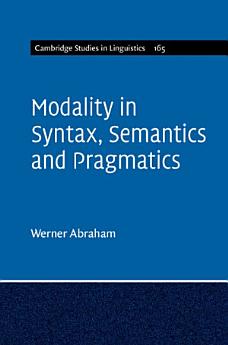Modality in Syntax, Semantics and Pragmatics
ກ.ຍ. 2020 · Cambridge Studies in Linguistics ຫົວທີ 165 · Cambridge University Press
ປຶ້ມອີບຸກ
455
ໜ້າ
reportບໍ່ໄດ້ຢັ້ງຢືນການຈັດອັນດັບ ແລະ ຄຳຕິຊົມ ສຶກສາເພີ່ມເຕີມ
ກ່ຽວກັບປຶ້ມ e-book ນີ້
What do we mean when we say things like 'If only we knew what he was up to!' Clearly this is more than just a message, or a question to our addressee. We are expressing simultaneously that we don't know, and also that we wish to know. Several modes of encoding contribute to such modalities of expression: word order, subordinating subjunctions, sentences that are subordinated but nevertheless occur autonomously, and attitudinal discourse adverbs which, far beyond lexical adverbials of modality, allow the speaker and the listener to presuppose full agreement, partial agreement under presupposed conditions, or negotiation of common ground. This state of the art survey proposes a new model of modality, drawing on data from a variety of Germanic and Slavic languages to find out what is cross-linguistically universal about modality, and to argue that it is a constitutive part of human cognition.
ກ່ຽວກັບຜູ້ຂຽນ
Werner Abraham is Professor Emeritus in Linguistics and Mediaeval Studies at the Rijksuniversiteit Groningen, The Netherlands, Honorary Professor at the Universität Wien, and is still active at the Ludwig Maximilan University of Munich, Germany. He is author of more than 350 articles, 5 monographs, and 35 book collections.
ໃຫ້ຄະແນນ e-book ນີ້
ບອກພວກເຮົາວ່າທ່ານຄິດແນວໃດ.
ອ່ານຂໍ້ມູນຂ່າວສານ
ສະມາດໂຟນ ແລະ ແທັບເລັດ
ຕິດຕັ້ງ ແອັບ Google Play Books ສຳລັບ Android ແລະ iPad/iPhone. ມັນຊິ້ງຂໍ້ມູນໂດຍອັດຕະໂນມັດກັບບັນຊີຂອງທ່ານ ແລະ ອະນຸຍາດໃຫ້ທ່ານອ່ານທາງອອນລາຍ ຫຼື ແບບອອບລາຍໄດ້ ບໍ່ວ່າທ່ານຈະຢູ່ໃສ.
ແລັບທັອບ ແລະ ຄອມພິວເຕີ
ທ່ານສາມາດຟັງປຶ້ມສຽງທີ່ຊື້ໃນ Google Play ໂດຍໃຊ້ໂປຣແກຣມທ່ອງເວັບຂອງຄອມພິວເຕີຂອງທ່ານໄດ້.
eReaders ແລະອຸປະກອນອື່ນໆ
ເພື່ອອ່ານໃນອຸປະກອນ e-ink ເຊັ່ນ: Kobo eReader, ທ່ານຈຳເປັນຕ້ອງດາວໂຫຼດໄຟລ໌ ແລະ ໂອນຍ້າຍມັນໄປໃສ່ອຸປະກອນຂອງທ່ານກ່ອນ. ປະຕິບັດຕາມຄຳແນະນຳລະອຽດຂອງ ສູນຊ່ວຍເຫຼືອ ເພື່ອໂອນຍ້າຍໄຟລ໌ໄໃສ່ eReader ທີ່ຮອງຮັບ.







